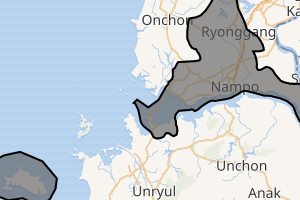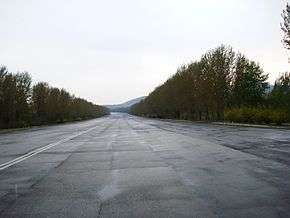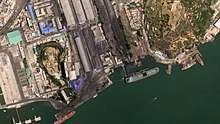Nampo
Nampo (North Korean official spelling: Nampho; pronounced [nam.pʰo]), also spelled Namp'o, is a city and seaport in South Pyongan Province, North Korea, which lies on the northern shore of the Taedong River, 15 km east of the river's mouth. Formerly known as Chinnamp'o, it was a provincial-level "Directly Governed City" ("Chikhalsi") from 1980 to 2004, and was designated a "Special City" ("T'ŭkgŭpsi"; tŭkpyŏlsi; 특별시; 特別市) in 2010, and made a part of South P'yŏngan. Namp'o is approximately 50 km southwest of P'yŏngyang, at the mouth of the Taedong River.
Nampo 남포시 | |
|---|---|
| 남포특별시 | |
| Korean transcription(s) | |
| • Chosŏn'gŭl | 남포특별시 |
| • Hancha | 南浦特別市 |
| • McCune-Reischauer | Namp'o-t'ŭkpyŏlsi |
| • Revised Romanization | Nampo-teukbyeolsi |
Views of Nampo | |
Map of South Pyongan showing the location of Nampo | |

| |
 Nampo Location in North Korea | |
| Coordinates: 38°44′N 125°24′E | |
| Country | |
| Province | South P'yŏngan |
| Administrative divisions | 5 kuyok, 2 kun |
| Government | |
| • Party Committee Chairman | Kang Yang-mo[1] (WPK) |
| • People's Committee Chairman | Ri Kil-chun[1] |
| Area | |
| • Total | 829 km2 (320 sq mi) |
| Population (2008) | |
| • Total | 366,815 [2] |
| • Dialect | P'yŏngan |
| Time zone | UTC+9 (Pyongyang Time) |
Namp'o was originally a small fishing village that became a port for foreign trade in 1897, developing into a modern port in 1945 after World War II. With the rapid increase in state investment, the city's industrial capacity grew. Some of the city's industrial facilities include the city's Smelter Complex, Glass Corporation, Shipbuilding Complex, Fishery Complex, and other central and local factories. Namp'o is a center for the DPRK shipbuilding industry. North of the city are facilities for freight transportation, aquatic products, and fishery, and a sea salt factory. Apples grown in the city's Ryonggang district (룡강군) are a famous local product.[3]
Administrative divisions
Namp'o is divided into 5 kuyŏk and 2 kun, which are in turn subdivided into tong and ri:
|
Climate
| Climate data for Nampo | |||||||||||||
|---|---|---|---|---|---|---|---|---|---|---|---|---|---|
| Month | Jan | Feb | Mar | Apr | May | Jun | Jul | Aug | Sep | Oct | Nov | Dec | Year |
| Average high °C (°F) | 0.0 (32.0) |
1.7 (35.1) |
7.4 (45.3) |
15.1 (59.2) |
21.0 (69.8) |
25.2 (77.4) |
27.6 (81.7) |
27.9 (82.2) |
24.0 (75.2) |
18.0 (64.4) |
9.7 (49.5) |
1.7 (35.1) |
14.9 (58.9) |
| Daily mean °C (°F) | −4.6 (23.7) |
−3.0 (26.6) |
2.8 (37.0) |
9.7 (49.5) |
15.6 (60.1) |
20.3 (68.5) |
23.8 (74.8) |
23.9 (75.0) |
19.3 (66.7) |
12.6 (54.7) |
5.0 (41.0) |
−2.4 (27.7) |
10.2 (50.4) |
| Average low °C (°F) | −9.1 (15.6) |
−7.6 (18.3) |
−1.7 (28.9) |
4.4 (39.9) |
10.3 (50.5) |
15.5 (59.9) |
20.1 (68.2) |
19.9 (67.8) |
14.7 (58.5) |
7.3 (45.1) |
0.3 (32.5) |
−6.4 (20.5) |
5.6 (42.1) |
| Average precipitation mm (inches) | 14 (0.6) |
15 (0.6) |
25 (1.0) |
37 (1.5) |
77 (3.0) |
100 (3.9) |
278 (10.9) |
185 (7.3) |
100 (3.9) |
40 (1.6) |
37 (1.5) |
17 (0.7) |
925 (36.5) |
| Source: Climate-Data.org[5] | |||||||||||||
Transportation

Road
The Youth Hero Motorway connects Namp'o to P'yŏngyang.
Air
Onch'ŏn Airport in Onch'ŏn-gun serves Namp'o Special City; Air Koryo operates charter flights from here.
Rail
The greater Namp'o area is densely served by the Korean State Railway, with 18 stations on the P'yŏngnam Line, the entirety of the Ryonggang Sŏhaekammun and Taean lines, and one station on the Ŭllyul Line being located inside the boundaries of Namp'o-t'ŭkpyŏlsi.
Sea

The West Sea Barrage of the port of Namp'o, built by erecting an 8-km long sea wall, has three lock chambers which allow the passage of ships up to 50,000 tons, and 36 sluices. Namp'o Harbour is often used as the primary port of call for receiving foreign food aid assistance into North Korea. The port of Namp'o has modern harbour facilities that can accommodate ships of 20,000 tonnes but is frozen during the winter. Namp'o serves as Pyongyang's port on the Yellow Sea.[6]
In 2008, the harbour received several batches of grain delivery; the first batch delivered in June was sent by the United States and weighed 38,000 tons. A South Korean-based relief organisation, Join Together Society, donated one batch of flour in October of the same year weighing approximately 500 tons.[7]
Education
Institutes of higher learning in Namp'o include
- Namp'o University
- Sŏhae University
- Samgwang College
- Sunhwa College
- Namp'o University of Medicine
- Namp'o University of Agriculture
- Namp'o College of Shipping Industry
- Namp'o Building Materials College
- Namp'o University of Fisheries
Sister cities
References
- "Organizational Chart of North Korean Leadership" (PDF). Seoul: Political and Military Analysis Division, Intelligence and Analysis Bureau; Ministry of Unification. January 2018. Retrieved 17 October 2018.
- DPR Korean Central Bureau of Statistics: 2008 Population Census (2008 population census, published in 2009)
- "North Korea". Britannica.com. Retrieved 14 December 2017.
- Kim So Yeol (15 February 2011). "North Korea Splits No. 38 and 39 Departments Up Again". Daily NK. Retrieved 15 November 2012.
- "Climate: Nampo - Climate-Data.org". Retrieved 14 December 2017.
- Seoul, Yonhap News Agency (27 December 2002). "North Korea Handbook". M.E. Sharpe. Retrieved 15 December 2017 – via Google Books.
- KINU White paper on human rights in North Korea, 2009 (Chapter G. Human Rights Violations Inside Political Concentration Camps (Kwanliso), p. 125)
- Перспективные направления сотрудничества [Prospective areas of cooperation] (in Russian). Committee for External Relations of Saint-Petersburg. Retrieved 22 October 2017.
- "Sister cities between DPRK and Mexico". KCNA. 27 July 2003. Archived from the original on 8 September 2017. Retrieved 3 December 2017.
- "Friendly Ties Opened between DPRK and Ecuadorian Cities". KCNA. 10 August 2005. Archived from the original on 8 September 2017. Retrieved 3 December 2017.
Further reading
- Dormels, Rainer. North Korea's Cities: Industrial facilities, internal structures and typification. Jimoondang, 2014. ISBN 978-89-6297-167-5
External links
| Wikivoyage has a travel guide for Nampho. |
| Wikimedia Commons has media related to Nampo. |
- Korea Tourist Map (English, Korean, Japanese, Chinese)
- North Korea Uncovered, North Korea Google Earth: labels most of Namp'o's infrastructure locations including hotels, nearby UNESCO sites, railroads, West Sea Barge, electricity grid, and shipping facilities.
- Nampo City (North Korea) on YouTube
- North Korea – Passing through Nampo (DPRK) on YouTube
- Profiles of the cities of DPR Korea – Nampho, koreanologie.univie.ac.at; accessed 14 December 2017.